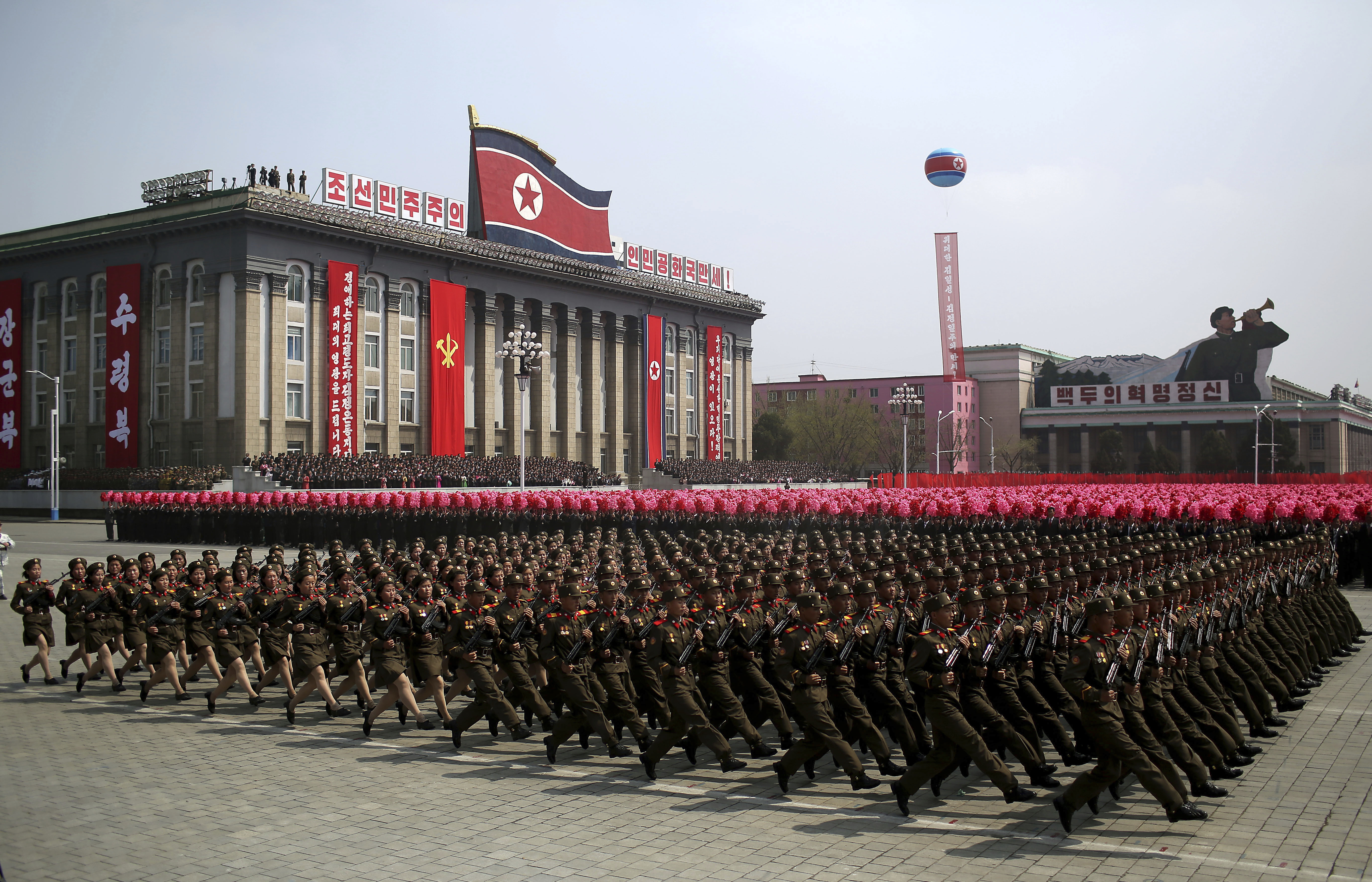The North Korea nightmare
Why tensions with the hermit kingdom are only going to get worse


A free daily email with the biggest news stories of the day – and the best features from TheWeek.com
You are now subscribed
Your newsletter sign-up was successful
When it comes to North Korea and this weekend's holiday theatrics — military parades featuring Pyongyang's latest missiles and technological terrors, along with a failed missile test — there is only one thing that is clear: Tensions on the Korean peninsula are only going to get worse.
Military necessity — at least in North Korea's eyes — and not saber rattling are clearly the culprit. Kim Jong Un — the leader of a nation that has an economy smaller than Ethiopia — knows all too well he has no way to match the United States, South Korea, and Japan ship for ship, plane for plane in a symmetrical sense. The only way he can hope to deter his enemies is to build the ultimate game-changer: nuclear weapons paired with missiles that can strike all the way across the globe. But to do that he must test his nuclear weapons and missiles time and time again to make sure he has a viable deterrent. And that is a problem. Every time Kim tests a new weapons system — or decides to parade them down the street — the world goes into a panic.
And from there, things only get worse. Combine the above with Pyongyang's other weapons of mass destruction — chemical, biological, and likely radioactive platforms — and North Korea has the means to kill millions of people in Korea, Japan, and across Asia. One false move on either side could start a Second Korea War, and with 25 million people in Seoul alone, only miles from the Demilitarized Zone that separates North and South, the stakes could not get any higher.
The Week
Escape your echo chamber. Get the facts behind the news, plus analysis from multiple perspectives.

Sign up for The Week's Free Newsletters
From our morning news briefing to a weekly Good News Newsletter, get the best of The Week delivered directly to your inbox.
From our morning news briefing to a weekly Good News Newsletter, get the best of The Week delivered directly to your inbox.
The trends are quite clear — and quite terrifying. Pyongyang will press forward building a robust military arsenal, and Washington and its allies will continue to negate such a build-up with counter measures: missile defense systems like THAAD; offensive weapons like stealth fighters and bombers; the rotating in of "armadas;" and, perhaps eventually, tactical nuclear weapons transferred back to South Korea from the U.S.
How to break the cycle:
So is there a way to actually lessen tensions on the Korean peninsula and move towards some lasting settlement? Perhaps, but the path is full of peril and without guarantee of success.
First, Washington must work with the international community — that means you, China, as well — to contain North Korea's nuclear and missile programs as robustly as possible. Secondary sanctions would be applied to any nation, financial entity, company, or individual who dared help the regime build such weapons. The Trump administration — and, indeed, the world — must declare that if you seek to profit from helping one of the world's most rogue regimes you will pay the most severe of prices: becoming an international pariah. The goal should be simple: Limit the growth of North Korea's nuclear and missile programs as much as possible short of military action through cutting off outside help as much as possible.
A free daily email with the biggest news stories of the day – and the best features from TheWeek.com
Second, we can't just use sanctions to limit Pyongyang's nuclear and missile systems — we need to go further. The Trump administration must use cyber weapons, just as the Obama administration did in the case of Iran's nuclear program, to slow the speed at which these programs can grow. While reports indicate such efforts are in full swing, the Trump administration should review them and make sure we are doing all we can in the cyber realm to make these programs as hard as possible to advance.
Finally, and most importantly, we are well past the point where it is makes sense to open talks with North Korea — as repulsive as that sounds. We should go into such talks clear-eyed, knowing that Pyongyang is not exactly the most reliable of negotiation partners and has rarely ever kept its word. Even though the chances of success are slim, if Washington were to approach Kim with just a simple offering of open talks with no specific goal — merely to build trust — knowing ultimately how much the deck is stacked against him, he might decide exploring such talks could be in his own best interests.
The ultimate question: Can we accept peace with North Korea?
Let's say we can get to some sort of stable — and at least transactional relationship with North Korea — where war is not imminent. There is still a much bigger question worth asking: Can the U.S. public, and indeed, the international community make peace with a regime as horrible as North Korea? Are we really able to accept having some sort of ties with a nation that has active gulags? Are we okay morally with actively working with a government that has killed over one million of its own people in prison camps? How will human rights activists, Christian groups, America's ruling political class, and the U.S. electorate feel about dealing with such "bad hombres"? Can we make peace with North Korea in a geostrategic sense and somehow stomach the abuses their people would still suffer? Some would say if were able to come to some sort of resolution that we are not only legitimizing their behavior, with prison camps three times the size of Washington, D.C., but actually encouraging it.
That's just another reason why North Korea is the problem from hell — and why no one has ever rushed to "solve it."
Harry J. Kazianis is director of defense studies at the Center for the National Interest, founded by former U.S. President Richard M. Nixon.
-
 The Olympic timekeepers keeping the Games on track
The Olympic timekeepers keeping the Games on trackUnder the Radar Swiss watchmaking giant Omega has been at the finish line of every Olympic Games for nearly 100 years
-
 Will increasing tensions with Iran boil over into war?
Will increasing tensions with Iran boil over into war?Today’s Big Question President Donald Trump has recently been threatening the country
-
 Corruption: The spy sheikh and the president
Corruption: The spy sheikh and the presidentFeature Trump is at the center of another scandal
-
 Epstein files topple law CEO, roil UK government
Epstein files topple law CEO, roil UK governmentSpeed Read Peter Mandelson, Britain’s former ambassador to the US, is caught up in the scandal
-
 Iran and US prepare to meet after skirmishes
Iran and US prepare to meet after skirmishesSpeed Read The incident comes amid heightened tensions in the Middle East
-
 Israel retrieves final hostage’s body from Gaza
Israel retrieves final hostage’s body from GazaSpeed Read The 24-year-old police officer was killed during the initial Hamas attack
-
 China’s Xi targets top general in growing purge
China’s Xi targets top general in growing purgeSpeed Read Zhang Youxia is being investigated over ‘grave violations’ of the law
-
 Panama and Canada are negotiating over a crucial copper mine
Panama and Canada are negotiating over a crucial copper mineIn the Spotlight Panama is set to make a final decision on the mine this summer
-
 Why Greenland’s natural resources are nearly impossible to mine
Why Greenland’s natural resources are nearly impossible to mineThe Explainer The country’s natural landscape makes the task extremely difficult
-
 Iran cuts internet as protests escalate
Iran cuts internet as protests escalateSpeed Reada Government buildings across the country have been set on fire
-
 US nabs ‘shadow’ tanker claimed by Russia
US nabs ‘shadow’ tanker claimed by RussiaSpeed Read The ship was one of two vessels seized by the US military
